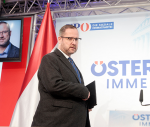You are here
The European Neighbourhood Policy review — what is beyond?
Mar 22,2015 - Last updated at Mar 22,2015
Over the past 10 years, our partnership with Jordan has been extremely successful and has been conducted in the framework of the European Neighbourhood Policy, the basis for our cooperation with countries around the EU borders.
But the ENP has not always been able to offer adequate responses to the changing aspirations of our partners. And therefore, the EU’s own interests have not been fully served either.
That is why the EU has proposed a far-reaching review of this policy.
On March 4, EU High Representative Federica Mogherini and Commissioner for Neighbourhood Policy Johannes Hahn launched a four-month consultation with all our partners on the way forward.
In the review, I believe we need to look at four key points.
First, what can we do to increase the scope for differentiation in the way we work with our partners?
We have partners in the south who are willing to work in the framework of very demanding agreements with us.
Some partners in the east are embarking on association and deep trade agreements — and while the scope of these has not been exhausted, they aspire to more.
All this calls for some new ways of working.
We need to do more to recognise that our partners are very diverse. Not just different east and south, but within the south and within the east.
This brings me to my second point: ownership.
We will never get the best from this policy unless it is a partnership actively chosen by both sides — a partnership of equals.
The new ENP must reflect the views and experience of our partners.
I believe that to achieve greater ownership among our partners, people want to see results within a shorter time frame, in order to understand if a policy has paid off.
My third point is therefore focus.
I want to get away from the current model where we try to cover a very wide range of sectors with every partner.
For those that want, we should continue to pursue wide-ranging cooperation, helping the country align with EU standards. For others, let us focus on fewer sectors.
Trade and mobility have been the traditional focus points. I want us to consider some that have been neglected in some ways up to now: both our energy security and that of our partners; and threats to security, from organised crime to the frozen conflicts.
Lastly, we need to be more flexible. This means being able to react to changing circumstances and crises, adapting our priorities and their implementation to new realities when they arise.
And to make things clearer and transparent, we have published the consultation paper that is now on the delegation website.
We are determined to consult as widely as possible, to design a policy that is really fit for purpose.
Some people ask whether all this talk of pursuing interests means that we are giving up on our values. The answer is very clearly no.
The promotion of democracy, human rights and the rule of law is a defining characteristic of the EU.
It is my view that the values that are at the core of the EU are also in the own interests of Jordan.
I will give an example: The equal implementation of the rule of law is key to attracting outside investment.
An independent judiciary and a system where justice is free from corruption is not only a value in itself, but it is also a key factor in the economic development of a country, indispensable to creating an environment for growth.
With Jordan, we made a lot of progress in our bilateral relations.
When I think about EU-Jordan collaboration, I believe every one of us needs to pay more attention to the positive impact such relation has on everyday life.
Enhancing EU-Jordan relations, politically and economically, is in the EU’s and Jordan’s mutual interest and benefit.
The Kingdom, which has enjoyed advanced status with the EU since 2010, has gone through several agreements, such as the “Mobility partnership”, that aims to facilitate citizens’ mobility and visits to EU countries.
In addition to this, Jordan and the EU have been constantly enhancing policy dialogue on various sectors and issues, including human rights and engagement with civil society.
In terms of financial allocation throughout the period 2007-2013, a total of 488 million euros was initially allocated to the Kingdom.
And in order to support implementation of key political and socio-economic reforms, the EU made available an additional amount of 100 million euros over the period 2012-2013, and also decided, in 2014, to provide a macro financial assistance package of 180 million euros.
The EU is also supporting Jordan to handle the impact of the Syrian crisis, as it has provided so far more than 320 million euro since 2011 in humanitarian, crisis response and development.
Moreover, the country also profits from external actions under several EU internal programmes, as for example the Erasmus+ programme, which enhances cooperation with the EU in the field of higher education, and the EU research programme Horizon 2020.
In addition to all of this, Jordan enjoys the possibility to benefit from a wide range of EU thematic instruments, such as the “Neighbourhood regional programmes”, the “Partnership Instrument” and the “European Instrument for Democracy and Human Rights”.
The EU remains deeply committed to assisting the Kingdom in its response to domestic and external challenges as it recognises its vital role in the region.
The fact that His Majesty King Abdullah visited the EU Parliament and other EU institutions several times reflects the strong partnership Jordan and the EU have.
This was also highlighted in His Majesty’s remarks at the EU Parliament early in March, stressing the historical relation the Kingdom has with Europe and illustrating common ground by which the EU and Jordan have mutual interest.
There is no doubt: Our current and future well-being is deeply interconnected with conditions in the wider region.
Reaching the full potential of relations with the Jordanian authorities and people, building more robust relations with them, will make all our countries safer, better places to live in.
The writer is ambassador of the European Union to Jordan. She contributed this article to The Jordan Times.










